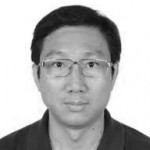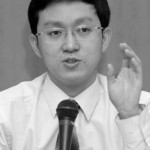-
30 May
ZHANG Lijia
ZHANG Lijia 张丽佳
Writer, Journalist, and Public Commentator
ZHANG Lijia is a factory-worker-turned writer, social commentator and public speaker. One of the few Chinese who write regularly in English for international publications, her articles have appeared in The Guardian, The South China Morning Post, Newsweek and The New York Times. She is the author of the critically acclaimed memoir “Socialism Is Great!” about her rocket factory experience and her debut novel Lotus, on prostitution in contemporary China, was published by Macmillan in January 2017. She is a recipient of the prestigious fellowship in the International Writer’s Program at the University of Iowa. Lijia has lectured at many conferences, institutions and universities around the world, including Asia EU Economic Forum, European Institute for Asian Studies, The University of Sydney, Harvard, Columbia, Stanford and New York University. She is a regular speaker on the BBC, Channel 4, CNN and NPR
Read more... -
17 Nov
Researchers’ Night 2.0
The ThinkIN China team, EURAXESS Links China, the European University Centre at Peking University and the Understanding Science team are delighted to invite you to the second edition of Researchers’ Night.
We will provide a convivial and informal atmosphere for you to share and discuss your research interests with other local and international members of the researchers community in Beijing.
The event is open to PhD students and Postdocs from all fields of research.
The first part of the evening will be organized around informal discussion tables divided by subject while the rest of the evening will allow all participants to network. The only requirement for participants is to prepare a short self-introduction of length 2-3 minutes specifying their research interests.
Refreshments will be provided during the evening to all the participants.
Please note that the registration deadline is Sunday, November 24. Later applications will be accepted at our sole discretion. To register for the event, send an email to EUC2009@pku.edu.cn writing “Researchers’ Night 2.0” as the email subject. Please include in the email your full name, country, academic affiliation and subject of study.
DATE AND VENUE
November 27, 2013 (Wed) 7pm
Bridge Café, right beside the Wudaokou subway station.
Read more... -
24 May
#26 event report: Back to Polygamy: Multilateralism in China-EU Relations
Back to Polygamy: Multilateralism in China-EU Relations
May 22, 2013, Bridge Café (Wudaokou)
Speaker: Prof. Dr. ZHOU Hong 周弘, Director, Institute of European Studies, Chinese Academy of Social Sciences
Presentation
Professor Zhou opened her speech by addressing some of the common stereotypes that cloud relations between China and Europe. For many in Europe, China appears to have a dual personality. While it purports to support European integration, it uses subversive measures to undermine European strength and disintegrate a more cohesive political and economic union. As such, China is often viewed as contributing to an asymetry of powers between member states and the EU government in Brussels. This stereotype stems from a lack of understanding among both parties.
Along those lines, Europe has a rather comparable image among most Chinese. In China, the EU is seen as playing a shuanghuang (双簧), or two-man comic show. In essence, while one actor makes certain gestures to the audience, the other dances around and acts out something entirely to the contrary. To many Chinese, it seems that European countries have adopted such behavior in a wide range of issues, particularly trade policy, saying one thing and doing another.
Moving forward, Professor Zhou recapped the major milestones in the EU-China relationship. October 2003 marked the beginning of what some have coined the “Sino-EU honeymoon.” At that time, leaders from the EU and China announced their willingness to pursue a “comprehensive strategy partnership,” a phrase that was echoed by rhetoric among major players in industry, government, academia, and journalism. China issued its first policy paper on the EU, and the EU followed through with its fifth such analysis of the Chinese side. Furthermore, programs like the National Indicative Program fortified such pronouncements with tangible projects to boost cooperation. At the pinnacle of such collaboration was the Galileo satellite navigation project, which had theretofore been met with a degree of resistance from the United States.
Soon, however, the honeymoon ended, giving way to disenchantment. Trade disputes plagued the once-happy marriage, as did state visits by the Dalai Lama and protests during the procession of the Olympic torch leading up to the 2008 Olympics in Beijing. Against this backdrop, Professor Zhou noted that some of her colleagues argue for the need to hedge the EU-China relationship rather than cooperate with full sincerity. According to such Cold War style of thinking, there are conflicts of interest; therefore, in a search for equilibrium, the bilateral ties must transmit across a “synergetic constellation,” otherwise known as checks and balances. Such an equilibrium is met only through constant adjustments, conflicts, game-plaing, and in extreme cases, even wars. However, Professor Zhou categorically rejected such arguments, noting that aforementioned scholars have completely forgotten the lessons of post-WW2 Europe, namely that legal provisions and a spirit of cooperation help grow markets and raise living standards.
In order to better understand the unique nature of Europe, Professor Zhou returned to the honeymoon metaphor. According to her framework, a nightmare marriage is when, after the wedding, one partner discovers that the spouse has an unknown past or is changing rapidly. With regard to international politics, China has only recently discovered that the EU is changing, expanding rapidly and continuously redefining its role. At the same time, many in the EU have come to the realization that China’s history makes it difficult to understand. It is a nation that is proud, but sometimes not terribly secure.
The EU “sui generis,” or “uniqie characteristics” can be found it its core philosophy ” unity in diversity”. But this complicates the sufficiently difficult task of building rapport among international actors. The EU divides itself not only between the central Brussels administration and the member state governments, but also among various functions and sectors. Such divisions of power are in constant change, particularly since the Treaty of Lisbon in 2007. Professor Zhou referenced a personal anecdote: her institute at CASS used to invite different European ambassadors to a particular annual event. Following the 2007 treaty, the EU ambassador overrode that decision despite some diplomats having already accepted the invitation, creating a slew of complications. Such stories demonstrate how the EU leaves China totallly confounded. The Chinese government must approach specific member state governments to solve particular issues, and teh EU has no territory, just institutions. Yet in the end, the financial ties make a divorce both unfeasible and undesirable.
Professor Zhou then moved to a comparison between China’s relationships with European member states and the EU government. Whereas China and the then-European Community established diplomatic relations in 1975, certain northern European countries had done so bilaterally before the EU had begun to take shape. Thus, relations between China and the EU and China and EU member states developed in parallel. Both tiers allow for different types of communication. The EU, for instance, has taken the initiative on trade disputes, as with the recent solar panel dumping scandals. One of Professor Zhou’s colleagues, François Godemont, has argued that the EU needs to introduce fair competition for public procurement; in other words, force Chinese firms to demonstrate they do not benefit from soft loan requirements before gaining investment access. Member states, on the other hand, lend themselves to more bountiful cultural dialogue. Chinese find it much easier to relate to the historical heritages of individual nation-states. Exchange programs for students and other language learners serve as a cornerstone for friendly cooperation and understanding between China and Europe, and without the bilateral initiatives enacted by individual European governments, EU-China relations would be but a hollow skeleton.
In closing, Professor Zhou noted how the EU itself can hardly mend China’s image problem. Recent survey data suggests that China’s reputation continues to fall, despite increased economic ties that undoubtedly provide needed energy to a sagging financial system. Nonetheless, the relationship between Europe and China is strong, and it will grow rich even as its dynamic nature continues.
Q&A
The Q&A session began on the subject of how China perceives the US and Europe collectively as the “West,” while many note that their strategic goals are not always aligned. Professor Zhou noted that Europe is consummately the West, as it invented the core of Western ideas, institutions, and structures. Yet those concepts have influenced China as well. After the Chinese abandoned its archaic legal system in 1911, its first replacement was a translation of the German legal code. Granted, China cannot use such imported structures without a digestive process. Still, the ties between China and Europe demonstrate how the East-West boundary does not resonate with much historical evidence.
Several questions highlighted Europe’s shift east, not only in terms of newly admitted countries in the EU, but also capital flows and developing markets. Iceland and China have recently signed a free trade agreement, and Switzerland has also been trying to finalize such a treaty as well. In the end, argued Professor Zhou, Chinese people want to see Europe succeed. But markets may fail, and the EU must ensure that there are mechanisms that allow for smoother economic development.
(report by Dillon Powers)
Read more... -
10 May
#25 event report: Craving for Power: Energy and Security in China
April 30, 2013, Bridge Cafe (Wudaokou)
Speakers: Prof. Dr. Jørgen Delman, Department of Cross-Cultural and Regional Studies (TORS), Copenhagen University
and Mr. DENG Liangchun 邓梁春, Senior Programme Officer, Climate and Energy Programme, WWF ChinaPresentation from Prof. Dr. Jørgen Delman
Prof. Delman framed his speech as an attempt to discuss climate change vis-a-vis Chinese politics, and especially China’s international politics. The starting point when discussing China’s energy and climate change politics is the fact that China is a country lacking resources.
China is still a predominantly coal-based economy. This is literally visible as all major cities and especially Beijing are experiencing heavy pollution. Coal is major energy resource (68% of all energy in 2010 was from coal), and is followed by other traditional sources of energy such as oil which accounted to 19%, natural gas which accounted for 4.4%. All non fossil sources of energy combined were 8.6% of China’s resource use. This heavy dependence on fossil fuels has effects on environment.
When it comes to energy security in the international context, China’s stance is informed by its claim to the right to crave for power. This by itself poses a very important normative question. China consumes less than half of what the OECD countries use on average. These figures are even lower when broken down per capita. Therefore, China’s perspective is that it should have the right to aspire to spend as much energy as the OECD countries. This is also rooted in the logic that drives the debate in China and other areas on the right to pursue development.
China has noted an extremely high growth in terms of its share of energy consumption on a global level, as well as CO2 emission in the past two decades. China used to be exporter of oil until the late 1980s, and it was also exporting coal. However, due to the surge in energy use China has turned into a net importer. The outcome of this is that now China’s craving for energy resembles a challenge for the international energy system. China will continue to need ever more coal, gas and especially oil, which are all limited and increasingly costly resources; it also needs uranium for its nuclear sector, but uranium for now is not as concerning. This opens the question of balance and the prospects of other countries, especially the rapidly developing ones.
China’s energy strategy is multi pronged. For one, it will try to be self sufficient to the furthest possible extent. The main challenges for this are to secure cheap, adequate/stable supplies of resources, but also to pursue energy efficiency. Energy efficiency is pursued through investing in renewables, and devising low carbon economy, which also has a strong environmental consideration. Low carbon economy is a whole new model on paper, however it remains to be seen what happens in practice. Overall, China tries to building up its energy reserves that can last longer; it also aims to further diversify its reserves. It aims for long term supply contacts when it comes to energy import. It also invests in exploration and research and development of new resource bases.
A lot of these objectives are regulated with the Five Year plans and other policy measures on medium term. Special emphasis is put on reducing the need for energy, and fixing the unintended consequences regarding climate change. China has noted successful reduction of energy intensity of GDP compared to the rest of the world in the period 1999-2009, mostly due to investment in new technologies.
An important aspect of China’s energy security strategy is its foreign policy aspect. Since 1978, China embraced the role of important actor on the global energy market. This has become ever more important as it became a net importer of oil. A significant portion of its fossil fuels imports, in the first place gas, come through pipelines in neighboring countries, primarily Russia and Central Asia, as well as a new one from Myanmar to be opened soon. The pipelines themselves carry low to medium level risk. However, a higher risk is posed by the import of oil. By 2035 China will need to import more than 80% of its oil reserves from outside sources. Currently China imports oil from Iran, Angola, Russia, Oman, Brazil, Venezuela among others – however, they aim to diversify their suppliers, especially when it comes to areas that might experience potential political instabilities that can put the energy deals into jeopardy.
China’s strategy regarding its international procurement of oil is based on several priorities: building up strategic reserves, more trade and diversification away from politically unstable areas, pursuit of unconventional oil, crafting oil for credit/gas for credit arrangements, investing in foreign energy companies, extending the pipelines in its neighborhood, seek new resources in areas not previously targeted (Latin America and the Arctic). In this sense, politics and business join forces by offering attractive packets to partners and suppliers. Some of the issues are its oil transport chain and the questionable security around the Mallaca Strait, as well as the transport in a tense and militarized South China Sea and the East China Sea. Aside from political instabilities, there are threats from piracy at open sea, terrorism, blockades, as well as geopolitical tug-of-war primarily with the US.
In conclusion, Delman summed up the major challenges for China’s energy security strategy. First, it is shift towards a low carbon economy using non-fossil fuels. Second, there are the risks regarding fossil fuels, in the first place oil. In terms of international politics, there is an ongoing contention by the West, while all of that happens in an area very vaguely and loosely regulated. The main rules of energy politics are first-come-first-serve or best bidder gets the deal, and it seems that China learned those rules pretty quick. It is also a challenge to maintain low energy prices at home, which opens a conceptual gap (a state-controlled approach against market orientation).
Presentation from Mr. DENG Liangchun
Deng’s speech was focused on the role of renewable energy. He opened his discussion with an emphasis of China’s so called “national development mandate” – a norm established 3 decades ago by Deng Xiaoping, with 2050 serving as a benchmark. The “national development mandate” refers primarily to increasing the per capita GDP – and in this sense, there is still quite a long road ahead. The mandate for development informs the utmost governance priorities and overrides everything else.
One key challenge for China’s energy security strategy is overcoming the dependency on coal. Coal is still regarded as number one energy source, which is indicated by the infamous 70% figure (previously cited by Delman). China does have a plan to decrease its coal usage, due to safety and environment issues.
Second, an important challenge is the geographic distribution of resources within China, which Deng sees as unfavorable. The resources are scattered on the north and the west of the country, while the main industries and the most populated areas are in the east. The transport and the development of infrastructure (such as electric power networks) are a major source of trouble for the authorities. Therefore, after the accession to the WTO, along with the spike in usage of energy, investment into infrastructure and linking the various parts of the country together increased as well. The third important challenge is the increasing imbalance between supply and demand. It is the fast economic growth and the growing (and more expenditure oriented) middle class that make things much more complicated. Fourth, there is low level of technology in terms of efficiency and emission control of greenhouse gas emission and other pollutants.
While there are national targets (some of them already met) in terms of dealing with these challenges, there are some structural problems of the centrally planned economy that prevail. Institutional problems are omnipresent, as there is lagging coordination between various actors/ministries. Constant reorganization, as seen is the latest government reshuffle and integration of the national energy administration supports this point. Moreover, there is little coordination with other ministries that have a role in this process, such as the one of land and resources (responsible for coal reserves, gas, oil); environmental protection (environmental aspect) and so on.
Another aspect of the issue is something that has been discussed very rarely, and that is the politics of energy. While there is one party, and a central regultion/plan, there are different forces driving the policy agenda. This depends largely on who has direct access to the Central Committee of CCP, its Politburo and the Politburo Standing Committee. The heads of big energy SEOs are better represented, which is not true of other actors who might have divergent agendas (such as the environment ones). Therefore, fossil fuel industries have significant political support, which is not good news for conservation orgs like WWF.
A particular concern for Deng are the great imbalances between supply and demand as well as short term supply and long term sustainability. In the time of financial crisis and its aftermath the Chinese government undertook drastic measures to boost economy, primarily through investment into infrastructure, which led to a even higher consumption. The government is trying to make an all-winning situation where everyone benefits and especially alleviate the life of the disenfrenchised, but the reality is that the richer get more from subsidies instead. At the same time, there is no difference in the charges for rural and urban areas, although the disparity in the wealth and development between the two is more than obvious.
The international implications of this are that other developing states, with growing energy demand follow the example of China. This results with growing competition in the energy market, and if the supply cannot be increased, it will be even more competitive. China seeks to find mechanisms to fit in the global governance framework, but its domestic policy dictates different pace.
Shortages of energy supply always happen. Often, in order to meet green standards, the government resorts to shutting down energy intensive industries, which has its own economic costs. In terms of the societal awareness, it is interesting to see how the middle class pay most attention to the problem of intensive energy use – but then the same middle class contributes a lot to the perpetuation of the problem.
The debate renewable energy is very lively in China. Internationally speaking there is the so called climate change mandate – the aim to reduce GHG emission, reduce the average temperature, and so on – this means some fossil fuels must remain untouched, which is posing a challenge to China. So that is why they need to invest in renewables.
However, nowadays is not the best time to advocate investment in renewables, as there was a recent case of bankruptcy (Suntech, China’s leading manufacturer of solar cells and panels). Annual subsidies for renewables are not as high as assumed, they focus too much on the supply side, and on the international market on the expense of domestic one. According to Deng, what is really needed for the top leadership is a full cost analysis, including the social perspective, compare every energy development options and then proceed with policy measures.
Q&A
The first question concerned with the hypothesis of regime instability in Africa affecting energy (in)security. The question posed the dilemma of who is the source of such instability, and provided the examples of Western intervention being an obstacle to Chinese interests in the region. Delman argued that China might pursue of strategy of helping to stabilize regimes.
On the question of how China compares with other developing countries in terms of technology, Deng argued that while China has amazingly large production potential, its technological innovation level is not really advanced – it is still catching up, and needs time, effort and institutional reform to mobilize innovative capacities, also to reconcile with an alternate growth strategy.
Another question was posed regarding studies on how much resources are there left, and of data availability. The spekers argued that while there are numerous studies, even the best of them have limited scope, we surely will have more data in the future, and moreover, what is more costly today might be more accessible tomorrow When it comes to renewables – technical problems are not so important, but what we see from the German experience is that subsidies reduction as in Germany is an outcome of the EU crisis, and similar outcomes should be expected in China. External markets shutting down will inspire opposition from stubborn fossil fuel companies. The there is the question of incentives/subsidies. In China the problem is the lack of incentives of connecting companies with wind farms, as there are incentives only on supply side.
When it comes to the relationship between energy security and conflict scenarios, overall there is a strong preference for diplomatic efforts to military intervention. However, China is a new player in the energy field, while Westerners have been there for a while now, and that is why they have to deal with questionable players such as Iran – yet, soft power is not enough and they will need hard power too. China’s primary focus is its neighborhood, but here it cannot afford to lose the trust, so has to play a subtle game. With regards to Syria and all other warring areas we are yet to see what happens with (non)interventionism before making conclusions.
Read more... -
28 Apr
CHENG Xiaohe
Prof. Dr. CHENG Xiaohe 成晓河
Associate Professor, School of International Studies, Renmin University of China
 CHENG Xiaohe serves as associate professor at the School of International Studies, Renmin University of China. His main research focuses lie in the fields of China’s foreign relations in general and China’s relations with neighboring countries in particular. Dr. CHENG did his undergraduate work in international politics at Fudan University, Shanghai, and earned his doctorate in political science from Boston University.
CHENG Xiaohe serves as associate professor at the School of International Studies, Renmin University of China. His main research focuses lie in the fields of China’s foreign relations in general and China’s relations with neighboring countries in particular. Dr. CHENG did his undergraduate work in international politics at Fudan University, Shanghai, and earned his doctorate in political science from Boston University.(more…)
Read more... -
27 Apr
Chris Colley
Christopher K. Colley
Instructor, School of International Studies, Renmin University of China
Chris Colley has lived in China since 2002 and earned a Master’s degree from Renmin University, where he studied the modernization of the Chinese Navy. His articles on China have been published in the New York Times, Washington Post, and Reuters. In 2008 he was a visiting scholar at Stellenbosch University’s Centre for Chinese Studies in South Africa. He has also lectured on the Chinese military at the graduate level and to the Foreign Military Attaché Corps at the Beijing Military Attaché’s Club. Since 2008, he has been based at Renmin University’s School of International Studies where he currently teaches a course on China’s relations with India.
Read more... -
26 Apr
Jørgen Delman
Prof. Dr. Jørgen Delman 德尔曼
Professor of China Studies, Department of Cross-Cultural and Regional Studies (TORS), Copenhagen University
Former Director of the Nordic Institute of Asian Studies (NIAS) at Fudan University, Shanghai Professor Dr. Jørgen Delman has been working with China for more than 35 years, and he joins the China Studies group after more than 7 years as Director at NIAS Nordic Institute of Asian Studies. His research has concentrated on development dynamics in modern China. His primary focus has been on the relationship between China’s party-state and the organization of civil society, for many years the relationship between party-state and peasants/farmers and in recent years the interaction between the party-state and private business. He has worked with different sectors as cases, primarily agriculture and food and recently renewable energy. His work has been driven by a strong interest in innovation in China. Jørgen Delman has arranged a series of international conferences and he is an experienced public speaker on Chinese issues and often appears in the media.
Professor Dr. Jørgen Delman has been working with China for more than 35 years, and he joins the China Studies group after more than 7 years as Director at NIAS Nordic Institute of Asian Studies. His research has concentrated on development dynamics in modern China. His primary focus has been on the relationship between China’s party-state and the organization of civil society, for many years the relationship between party-state and peasants/farmers and in recent years the interaction between the party-state and private business. He has worked with different sectors as cases, primarily agriculture and food and recently renewable energy. His work has been driven by a strong interest in innovation in China. Jørgen Delman has arranged a series of international conferences and he is an experienced public speaker on Chinese issues and often appears in the media.
Jørgen Delman has lived and worked in China for 10 years, first as a student from 1977-1978 at the end of the Cultural Revolution when China’s reforms were about to start. Along his carrier, he worked in over a dozen countries in Asia and Africa for UN and EU development programs as well as private companies. Throughout most of his career, Jørgen Delman has worked as project Director and/or team leader on a considerable number of international development projects as well as on research projects and policy studies. He also holds a number of positions of trust in the academic world. He took his PhD degree in Chinese at the Institute of East Asian Studies, Aarhus University, in 1991 and his Masters degree at the same place in 1979. He is a regular Political Analyst on Danish TV, China advisor to the Danish government, Senior Advisor to joint EU-China development programs. He currently works with partners at Zhejiang University on a new project in Hangzhou that looks into the consequences of climate change politics for city governance.His recent publications focus on state-business and state-society interaction in China, with topics such as: The role of Dragon Head enterprises in China’s rural organization: from worn to green China-model; China’s energy security; the architecture of the biofuels market in China; green city making in Hangzhou.
Publications
- Delman, Jørgen. China’s “Radicalism at the Centre”: Regime Legitimation Through Climate Politics and Climate Governance. Journal of Chinese Political Science Vol. 16, 2, 2011, p. 183- 205 (first published on-line, 26.11.2010, DOI: 10.1007/s11366-010-9128-9)
- Delman, Jørgen, and Yin Xiaoqing, 2010. Individualization and the Political Agency of Private Business People in China. Halskov Hansen, M., R. Svarverud (eds.) China the Rise of the Individual in Modern Chinese Society. Copenhagen/Honolulu: NIAS Press, pp. 94-131.
- Delman, Jørgen. Agricultural Extension in Renshou County, China – A Case-study of Bureaucratic Intervention for Agricultural Innovation and Change. Hamburg: Institut für Asienkunde, Hamburg, 1993, 374 pp.
Read more... -
25 Apr
DENG Liangchun
DENG Liangchun 邓梁春
Senior Policy Program Manager, The Climate Group, World Wildlife Fund
 His research focuses on climate change, China’s strategy in the international climate regime and low carbon economy. He leads China’s policy briefings and related communication and strategic engagement works an is also in charge of the Pearl River Delta low carbon transition pilot project. DENG Liangchun is the leading author of TCG quarterly publication Climate Change Perspective, and one of the authors of the CAS report China’s Approach towards a Low Carbon Future. He works as consultant for Chinese and Foreign insitutions active in the areas of environmental protection and energy security, such as the China Council for International Cooperation on Environment and Development (CCICED), an advisory body for the Chinese national government. He completed his undergraduate study at Fudan University and holds an MA in Environmental Economics and Policy from Peking University.
His research focuses on climate change, China’s strategy in the international climate regime and low carbon economy. He leads China’s policy briefings and related communication and strategic engagement works an is also in charge of the Pearl River Delta low carbon transition pilot project. DENG Liangchun is the leading author of TCG quarterly publication Climate Change Perspective, and one of the authors of the CAS report China’s Approach towards a Low Carbon Future. He works as consultant for Chinese and Foreign insitutions active in the areas of environmental protection and energy security, such as the China Council for International Cooperation on Environment and Development (CCICED), an advisory body for the Chinese national government. He completed his undergraduate study at Fudan University and holds an MA in Environmental Economics and Policy from Peking University.(more…)
Read more... -
24 Apr
Tyra Díez
Tyra Díez Ruiz
PhD-candidate, University of Granada, Department of Theory of Literature
 Tyra Díez Ruiz is a PhD-candidate in the Department of Theory of Literature of University of Granada. She holds a BA in East Asian Studies and an MA in Literature from the Universitat Oberta de Catalunya (UOC). She lives in Beijing since 2007 and works as a translator and localization expert.
Tyra Díez Ruiz is a PhD-candidate in the Department of Theory of Literature of University of Granada. She holds a BA in East Asian Studies and an MA in Literature from the Universitat Oberta de Catalunya (UOC). She lives in Beijing since 2007 and works as a translator and localization expert.
Read more... -
23 Apr
Matt Ferchen
Prof. Dr. Matt Ferchen
Assistant Professor, Department of International Relations, Tsinghua University
 Ferchen is the first and only full‐time foreign faculty member at this department. He teaches courses on international political economy and area studies, with a focus on Chinese political economy and China‐Latin America economic and political ties. His research interests are in Chinese domestic political economy and the politics of China’s trade and investment relations with Latin America. Ferchen has an MA in international affairs from the Johns Hopkins School of Advanced International Studies (SAIS) and a Ph.D. in political science from Cornell University.
Ferchen is the first and only full‐time foreign faculty member at this department. He teaches courses on international political economy and area studies, with a focus on Chinese political economy and China‐Latin America economic and political ties. His research interests are in Chinese domestic political economy and the politics of China’s trade and investment relations with Latin America. Ferchen has an MA in international affairs from the Johns Hopkins School of Advanced International Studies (SAIS) and a Ph.D. in political science from Cornell University.Publications
- Whose China Model is it anyway? The contentious search for consensus, London: Taylor & Francis, 2012
- “China–Latin America Relations: Long-term Boon or Short-term Boom?” in The Chinese Journal of International Politics, Vol. 4, 2011, pp. 55–86
Read more... -
22 Apr
Eduardo Gagliardi
Dr. Eduardo Gagliardi
Department of Oriental Studies, University of Rome La Sapienza
Dr. Gagliardi completed a PhD in Contemporary Chinese cinema at the Faculty of Oriental Studies of the University of Rome, La Sapienza. He has worked with magazines and internet sites like China Files, Rockerilla, Movies, Caltanet, etc. and now lives and works in Beijing.
Read more... -
21 Apr
GUI Yongtao
Prof. Dr. GUI Yongtao 归泳涛
Associate Professor, School of International Studies, Peking University
 GUI Yongtao is an Associate Professor at the School of International Studies, Peking University. He received his BA from Peking University (1999). He was enrolled in a joint doctoral degree program sponsored by the Nippon Foundation in 2001 and received his Ph.D. in International Relations and Law from both Waseda University in Tokyo and Peking University (2005). His research subjects include American-East Asian relations and Asian nationalism. He currently teaches Comparative Politics, Sino-Japanese Relations, public diplomacy, and intensive reading for English Majors.
GUI Yongtao is an Associate Professor at the School of International Studies, Peking University. He received his BA from Peking University (1999). He was enrolled in a joint doctoral degree program sponsored by the Nippon Foundation in 2001 and received his Ph.D. in International Relations and Law from both Waseda University in Tokyo and Peking University (2005). His research subjects include American-East Asian relations and Asian nationalism. He currently teaches Comparative Politics, Sino-Japanese Relations, public diplomacy, and intensive reading for English Majors.Publications
- “Edwin O. Reischauer and the U.S. Policy toward Japan”, Chongqing: Chongqing Press, 2008
- “China- Japan-US Relations and Northeast Asia’s Evolving Security Architecture”, in Gerald Curtis, Ryosei Kokubun and Wang Jisi eds. “Getting the Triangle Straight: Managing China- Japan-US Relations”, Tokyo: Japan Center for International Exchange, 2010
- “East Asian Community: Hope or Disappointment?” China International Strategy Review 2010, Beijing: Shijie Zhishi Chubanshe, 2010
- “Government Change: A Cure for the Japanese Political Illness?” Foreign Affairs Review, No. 5, 2009
- “The Multiplicity of the History Issue between China and Japan”, in Liu Jie and Kawashima Shin eds. “Views of History in 1945: A Tentative Sino- Japanese Dialogue on the End of the War”, Tokyo: Tokyo University Press, 2009
- “The Rise of New Conservatism in Japan and the China-US-Japan Relations”, in Uno Shigeaki and Tang Yanxia ed. “Sino- Japanese Relations and the United States at Crossroads”, Kokusai Shoyin 2008
- “Japan’s Position on Humanitarian Intervention”, International Politics Quarterly, No. 1, 2008
- “Nationalism and the Historical Conceptions in Modern China, Japan and Korea”, International Politics Quarterly, No.2, 2007.
Read more... -
20 Apr
Nicola Horsburgh
Dr. Nicola Horsburgh
Researcher, Department of International Relations, University of Oxford, UK
Dr. Horsburgh serves at the Department of International Relations at the University of Oxford, St. Antony’s College. She is a third year doctoral candidate and British Inter-university Chinese Centre (BICC) student in the Department of International Relations at the University of Oxford, St. Antony’s College, supervised by Professor Foot. Her research explores Chinese engagement in the global nuclear order since 1949. Between 2003 and 2006, Horsburgh was a research fellow at King’s College London, working on nuclear nonproliferation in Northeast Asia. Horsburgh holds a BSc Econ (Hons) in International Politics and Strategic Studies from the University of Aberystwyth, an MSc in International Relations from the London School of Economics and Political Science, and an MPhil in Modern Chinese Studies from the University of Oxford. She has also studied at the University of Southern California and Peking University.
Publications
- co-edited with Astrid Nordin and Shaun Breslin, China, globalisation and innovation, (forthcoming 2012-13).
- ‘China and nuclear proliferation since 1949’, Limes (in Italian), special issue (forthcoming June 2012)
- ‘Change and innovation in Chinese nuclear weapons strategy’, China Information, Vol. 26 (2), July 2012, pp. 185-204.
- Fernando Mañas, Javier Jordan and Nicola Horsburgh, ‘Strengths and Weaknesses of Grassroot Jihadist Networks: The Madrid Bombings’, Studies in Conflict & Terrorism, Vol. 31 (1), 2008, pp.17-39.
- with Javier Jordan, ‘Politics vs. Terrorism: The Madrid Case’ in George Kassimeris eds., Playing Politics with Terrorism: A User’s Guide, (Hurst and Company: London, 2007).
- with Javier Jordan, ‘Spain and Islamist Terrorism: Analysis of the Threat and Response 1995-2005’, Mediterranean Politics, Vol. 11 (2), 2006, pp. 209-229.
- with Javier Jordan, ‘Spain: Islamic extremism’, in Karin Von Hippel, ed., Europe Confronts Terrorism, (Palgrave Macmillan, New York, 2005).
- with Javier Jordan, ‘Mapping Jihadist Terrorism in Spain’, Studies in Conflict & Terrorism, Vol. 28 (5), 2005, pp.169-191.
Read more... -
19 Apr
HUANG Jing
Dr. HUANG Jing 黄靖
Researcher, China Institute for Contemporary Relations (CICIR), Beijing
 Born in 1981, Dr. HUANG was awarded a BA in diplomacy and an MA in international politics from China Foreign Affairs University. Since 2010, she has been a Ph.D. student in European Studies at the China Institutes of Contemporary International Relations (CICIR), where she also serves as an assistant researcher. Her main research interests are public diplomacy, media and public opinion, national image and identity, and Sino-EU relations. She speaks fluent Mandarin, Cantonese, and English.
Born in 1981, Dr. HUANG was awarded a BA in diplomacy and an MA in international politics from China Foreign Affairs University. Since 2010, she has been a Ph.D. student in European Studies at the China Institutes of Contemporary International Relations (CICIR), where she also serves as an assistant researcher. Her main research interests are public diplomacy, media and public opinion, national image and identity, and Sino-EU relations. She speaks fluent Mandarin, Cantonese, and English.Publications
- “International Democracy: from the Perspective of Constructivism”
Read more... -
18 Apr
HUANG Yingying
Prof. Dr. HUANG Yingying 黄盈盈
Associate Professor, Department of Sociology, Renmin University of China
Deputy Director, Institute of Sexuality and Gender, Renmin University of China HUANG Yingying is associate professor of Sociology Department, deputy director of Institute of Sexuality and Gender, Renmin University of China. Her research focuses on female sex workers, male clients, women’s body and sexuality, social aspects of HIV/AIDS, and research methodology on sexuality. She is the author of the book ‘Body, Sexuality and Xinggan (sexiness): Study on Chinese Women’s Daily Lives’ and several publications on female sex workers and male clients in China since 1999. Her most recent research projects include: The emerging grassroots groups of female sex workers in China: agency and challenges under anti-prostitution policy; The rise of sex and sexuality studies since 1980s; The changing sexualities in China: population-based surveys in 2000, 2006 and 2010; Exploratory research on sexuality among PLWHA women in China; and Partnership for Social Science Research on HIV/AIDS in China.
HUANG Yingying is associate professor of Sociology Department, deputy director of Institute of Sexuality and Gender, Renmin University of China. Her research focuses on female sex workers, male clients, women’s body and sexuality, social aspects of HIV/AIDS, and research methodology on sexuality. She is the author of the book ‘Body, Sexuality and Xinggan (sexiness): Study on Chinese Women’s Daily Lives’ and several publications on female sex workers and male clients in China since 1999. Her most recent research projects include: The emerging grassroots groups of female sex workers in China: agency and challenges under anti-prostitution policy; The rise of sex and sexuality studies since 1980s; The changing sexualities in China: population-based surveys in 2000, 2006 and 2010; Exploratory research on sexuality among PLWHA women in China; and Partnership for Social Science Research on HIV/AIDS in China.
Read more...

